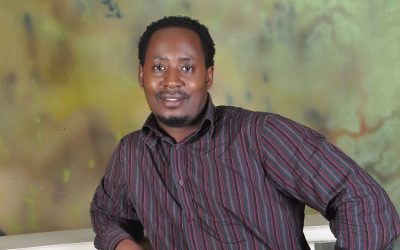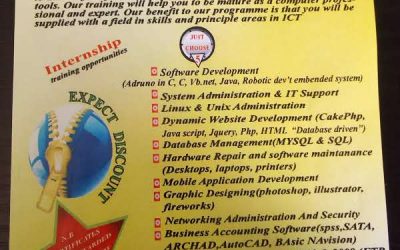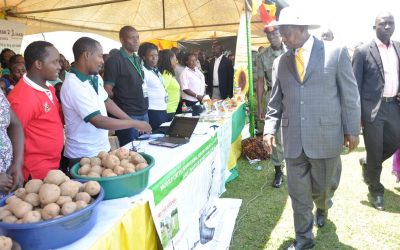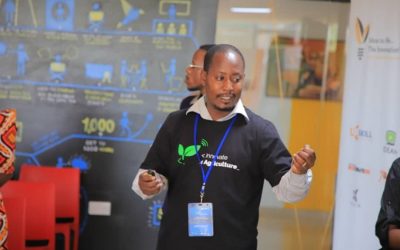His Passion For Tech Is Paying Off
The award-winning software developer, Katamba Ronald has developed analytics-driven solutions for agriculture and health. His work has been used to help create useful technologies in agriculture
Many youths are making a career choice in technology but he is a standout techprenuer bringing innovative analytics solutions to agriculture.
The founder of Afrosoft is developing diagnostic software based on emerging technologies to detect diseases in plants and livestock — making it faster, cheaper and robust. He is aggressively working to demonstrate how technology brings many possibilities.
It was an unlikely start for Katamba. In 2011, Katamba quit his job at Techno Brain where he says he was decently paid. The graduate student of Information Technology at Makerere University, had participated in the Imagine Cup, a student developer competition.
It was here that he focused on building his own startup, Afrosoft IT Solutions, which is housed at Teacher’s House along Bombo Road in Kampala. Having been inspired by Microsoft, he replaced Micro- to create Afro-soft.
He rents two rooms which he uses to hone skills of youths in entrepreneurial and IT skills. He says, the inner room used to act as his office and bedroom.
In 2013, Katamba announced his multi award Jaguza Livestock, a mobile-based app that monitors and detects diseases in animals, a brilliant innovation that transformed farmers by using information and communications technologies.
Jaguza Livestock App is a system used to monitor and diagnose early stages of diseases in animals, using sensor technology, and locate the whereabouts of animals in a given area using GPS systems.
Currently, Jaguza can be used online using the Android App or desktop App and offline via USSD and SMS.
While online, each time an animal moves out of range, a notification is sent to a solar powered receiver (SPR) from the device. The SPR sends this information to a cloud server which in turn sends information to your computer or mobile phone.
Integration of the app to Apple Cloud Services will go a long way to develop its functionality and hence reduce hazards to livestock productivity in Uganda.
In 2015, the app was selected as the best entrepreneurship start-up 2015 in Budapest, Hungary. It had in 2014 been selected by the UN in Uganda during the Younger Innovation Hangout as the most innovative startup. Last year, it was the winner of the 2019 CTA Pitch AgriHack competition hosted in Accra, Ghana.
Late last year, he led another team announcing he had developed Plant Scope system, which offers farmers real-time problem identification, on-time and on-site treatment. With just a snap-shot by drone or phone camera, a farmer is able to detect a disease and also access to nearest agronomist in no time hence ensuring efficient risk management. This includes knowing when to spray or add fertilisers.
“Plant Scope has made garden inspection much easier, with the use of drones, a farmer is able to tell crop pests and diseases affecting a few crops therefore be able to cub it down before it affects the whole garden. This in turn helps ensure good crop yield and food security.
In 2018, he was among the Ugandans selected by American Multinational technology giants, Apple Inc. and Microsoft Corporation for his cutting edge innovations on the Internet of things (IoT) to attend multiple conferences, including Microsoft Tech Summit, World Agric-Tech Innovation Summit and Hive Entrepreneurship Retreat.
Inspiration
The inspiration to develop his signature tool was drawn from painful childhood memories. Katamba kept rabbits to raise school fees after the death of his parents. But one morning, he found all of them dead.
“That is exactly what inspired me to build the app because I know there is someone out there who is like me, and they need help,” he said.
Advertisement
Before Jaguza, Katamba had developed Lunda, a mobile application that would follow up the gestation period and insemination of livestock. The app can be used online and offline. It was not a great success but he maintains that for a developer you keep searching for what works best.
Skilling
Katamba has traversed places to attend regional, continental and global technology events. These have been the bedrock of his activities.
The Jaguza Tech tag being placed on the cow’s ear. It helps monitor livestock health.
“We are driven by technology to find solutions but Africa still lags behind. As Afrosoft we are delighted to be finding solutions to agriculture, which is the backbone of Uganda’s agriculture,” Katamba says.
That is why Afrosoft availed an opportunity for young people to acquire soft skills in entrepreneurship and emerging technologies.
Afrosoft hosts students from various tertiary institutions on an internship program where they are groomed for real work on top of basic coding, programming and robotics.
These services come at a fee, beginning at Shs200,000 for those between 5 and 15, and then Shs350,000 for those at post-primary school level.
Interns are also offered an opportunity to work on Afrosoft contracts in order to expose them to hands-on experience.
He emphasises IoT is because it is being endorsed as the world advances to smart homes and cities.
Internet penetration remains in Uganda at 49 per cent and Katamba looks at IoT as a technology that “will speed up our lives and ease the way we do business.”
Jaguza, for instance, is able to track the movements of my cows. He developed another technology called Makotoba, which can be used to diagnose tuberculosis using a phone.
The latest development Plant Scope helps farmers and extension workers quickly identify diseases in plants using smart phones. IT specialists; Christine Kihunde, Joseph Matovu and Isaac Balintuma had a hand in the novel technology which uses neural networks to analyse compounds that plants release through their leaves to sniff diseases.
Challenges
Katamba’s technologies depend so much on Unmanned Aerial Vehicle (UAV) or drones. But the aircrafts, which are deemed to be a security risk, go through painstaking procedures which are not straightforward.
One must obtain a license from Uganda Police or the Uganda Peoples Defence Forces (UPDF).
Drone pilots in Uganda must have a license, which requires a lengthy application. Drones are pricey too; basic drones range from Shs300,000 to Shs1m.
On top of that, Afrosoft is still grappling with limited funding. Institutions like Naro and Microsoft have lent him a hand and the Information and Communications Technology (ICT) ministry.
The Uganda Communications Commission, the National Information and Technology Authority – Uganda (NITA-U) and the Uganda National Council for Science and Technology are the other partners.
“To do a good job, we must be given the proper support by the government to do it. We need support to be able to pull it off,” Katamba said.











